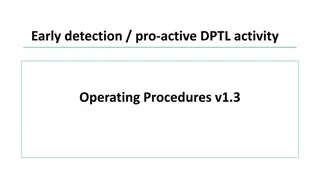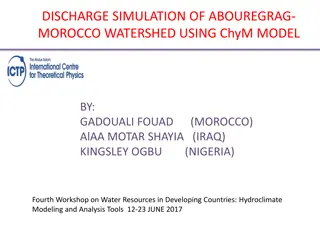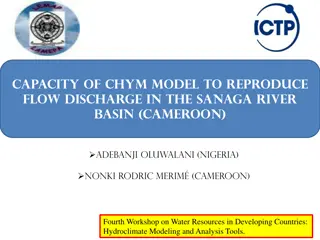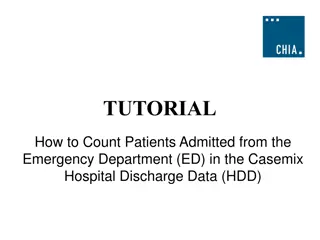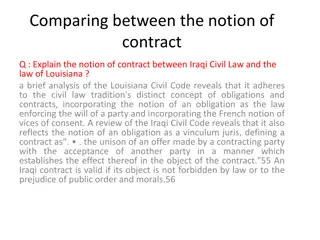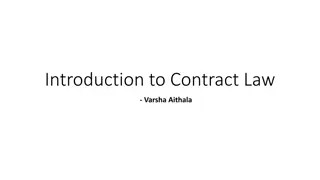Understanding the Discharge of Contract in Contract Law
Discharge of contract signifies the termination of the contractual relationship between parties. It ceases the binding power of the contract, releasing parties from their obligations. Modes of discharge include by performance, agreement, breach, lapse of time, supervening impossibility, and operation of law. Performance is a primary mode, fulfilled when parties meet obligations as agreed. Agreement-based discharge allows for mutual termination through novation, recission, and alteration.
Download Presentation

Please find below an Image/Link to download the presentation.
The content on the website is provided AS IS for your information and personal use only. It may not be sold, licensed, or shared on other websites without obtaining consent from the author. Download presentation by click this link. If you encounter any issues during the download, it is possible that the publisher has removed the file from their server.
E N D
Presentation Transcript
Introduction Discharge of contract means terminating the contractual relationship between the two or more parties who entered into the contract previously. When the rights, obligations and duties of the parties come to an end it is known as the discharge of contract. Discharge of contract also ceases the legally binding power of the contract. Therefore, once a contract has been discharged the parties are no more obligated to each other Samiuddin, Contract Law I
Modes of discharge of contract Discharge by performance Discharge by agreement Discharge by breach Discharge by lapse of time Discharge by supervening impossibility Discharge by operation of law Samiuddin, Contract Law I
DISCHARGE BY PERFORMANCE Performance of a contract is the principal and most useful mode of discharge of a contract. Discharge by performance takes place when the parties to the contract fulfill their obligations arising under the contract within the time and in the manner prescribed. Discharge by performance may be : i. By actual performance: When both the parties perform their promises, the contract is discharged. Performance should be complete, precise and according to the terms of the agreement. ii. By attempted performance or tender: When the promisor has made an offer by performance to the promisee but it has not been accepted by the promisee. Samiuddin, Contract Law I
DISCHARGE BY AGREEMENT OR CONSENT What has been created by agreement may be extinguished by agreement. The rule of law in this regard is as follows "a thing may be destroyed in the same manner in which it is constituted". This means a contractual obligations may be discharged by agreement which may be express or implied. Section 62 and 63 deal with this subject and provide for the following methods of discharging a contract by mutual agreement. Novation (Section 62): Where the parties to a contract substitute a new contract for the old contract, the old contract is discharged by novation. Section 62 of the Indian Contract Act deals with the effect of novation, recission and alteration of the existing contract. Example : A owes B Rs. 10,000. A enters into an agreement with B, and give B a mortgage of his (A's) estate for Rs. 5,000 in place of the debt of Rs. 10,000. This is a new contract and extinguishes the old. Samiuddin, Contract Law I
Rescission (Section 62): Recission means cancellation of the contract by any party or all the parties to a contract. In the case of rescission, only the old contract is cancelled and no new contract comes to exist in its place. Examples : (A) A promises to supply certain goods to B six months after date. By that time, the goods go out of fashion. A and B may rescind the contract. (B) X promises Y to sell and deliver 100 bales of cotton on 1st October at his godown and Y promises to pay for goods on 1st November. X does not supply the goods. Y may rescind the contract. Alteration (Section 62): Alteration of a contract may take place when one or more of the terms of the contract is/are altered by the mutual consent of the parties to the contract. In such case, the old contract is discharged. Alteration is valid if it is done with the consent of all the parties to the contract. Example : A enters into a contract with B for the supply of a 1,000 bales of cotton at his ware house on 1st July 1980. Later both A and B agree to postpone the date of delivery to 1st September 1980. This change amounts to alteration of the contract. Samiuddin, Contract Law I
Remission (Section 63): It means acceptance of lesser amount or lesser degree of performance than what was actually due under the contract. It is a unilateral act of the promise discharging at his will and pleasure of the obligation of another. The law in India is different from that in England. In England, a person cannot remit unless the fresh promise is supported by consideration. On the other hand, in India a promise may remit or give a part of his claim and a promisee to do so is binding even though there is no consideration for doing so. Example : A owed large sum of money to B. C offered to pay lesser sum in satisfaction of B's claim on A. B accepted it. It was held that the acceptance was in full satisfaction and B cannot claim balance from A after receiving payment in full satisfaction. [Kapur Chand vs Himayat Ali Khan AIR 1963]. Waiver: Waiver means intentional relinquishment of a right under the contract. Thus, it amounts to releasing a person of certain legal obligation under a contract. Consideration is not necessary for waiver. Samiuddin, Contract Law I
Mode of communicating or revoking rescission: The rescission of a voidable contract may be communicated or revoked in the same manner, and subject to the same rules, as apply to the communication, or revocation, of a proposal (Sec. 66). The party rescinding a voidable contract shall, if he has received any benefit thereunder from another party to such contract, restore such benefit, so far as may be, to the person from whom it was received (Sec. 64). Samiuddin, Contract Law I
Discharge by Impossibility of Performance If an agreement contains an undertaking to perform an impossibility, it is void ab initio. The rule is based on the following maxims: (1) Lexicon cogit ad impossibilia, i.e., the law does not recognise what is impossible, and (2) Impossibilium nulla obligato est, i.e., what is impossible does not create an obligation. Impossibility existing at the time of agreement: The first paragraph of Sec. 56 lays down that an agreement to do an act impossible in itself is void . This is known as pre-contractual or initial impossibility. Samiuddin, Contract Law I
Impossibility arising subsequent to the formation of contract: Impossibility which arises subsequent to the formation of a contract (which could be performed at the time when the contract was entered into) is called post- contractual or supervening impossibility. Examples: Destruction of subject-matter of contract. Non-existence or non-occurrence of a particular state of things. Death or incapacity for personal service. Change of law or stepping in of a person with statutory authority. Outbreak of war. Samiuddin, Contract Law I
IMPOSSIBILITY OF PERFORMANCE NOT AN EXCUSE In the following cases, a contract is not discharged on the ground of supervening impossibility. Difficulty of performance. Commercial impossibility. Impossibility due to failure of Strikes, lock-outs and civil disturbance. Failure of one of the objects. Samiuddin, Contract Law I a third person.
EFFECTS OF SUPERVENING IMPOSSIBILITY When the performance of a contract becomes impossible or unlawful subsequent to its formation, the Contract becomes void (Sec. 56, para 3). Where one person has promised to do something which he knew, or, with reasonable diligence, might have known, and which the promisee did not know to be impossible or unlawful, the promisor must make compensation to the promisee for any loss which the promisee sustains through the non-performance of the promise (Sec.56, para 3). Where an agreement is discovered to be void, or when a contract becomes void, any person who has received any advantage under such agreement or contract is bound to restore it, or to make compensation for it to the person from whom he received it (Sec. 65). Samiuddin, Contract Law I
DOCTRINE OF FRUSTRATION In England, the doctrine of frustration is the concept that is analogous to supervening impossibility. It comes into play when the common object of a contract can no longer be achieved or when the contract, after it is made, becomes impossible of performance due to circumstances beyond the control or contemplation of the parties. Samiuddin, Contract Law I
DISCHARGE BY LAPSE OF TIME The Limitation Act, 1963 lays down that a contract should be performed within a specified period, called period of limitation. If it is not performed, and if no action is taken by the promisee within the period of limitation. He is deprived of his remedy at law. Samiuddin, Contract Law I The Limitation Act, 1963 lays down a period of three years for the enforcement of most types of rights.
DISCHARGE BY OPERATION OF LAW A contract may be discharged independently of the wishes of the parties, i.e., by operation of law. This includes discharge By death (in the case of contracts for personal service). By insolvency. By unauthorised alteration of the terms of a written agreement. By rights and liabilities becoming vested in the same person. Samiuddin, Contract Law I
DISCHARGE BY BREACH OF CONTRACT Breach of contract means a braking of the obligation which a contract imposes. It occurs when a party to the contract without lawful excuse does not fulfill his contractual obligation or by his own act makes it impossible that he should perform his obligation under it. Samiuddin, Contract Law I Breach of contract may be Actual breach of contract, or Anticipatory or constructive breach of contract.
Actual Breach of Contract It may take place At the time when the performance is due. Actual breach of contract occurs, when at the time when the performance is due, one party fails or refuses to perform his obligation under the contract. During the performance of the contract. Actual breach of contract also occurs when during the performance of the contract, one party fails or refuses to perform his obligation under the contract. This refusal to perform may be by Express repudiation (by word or act). Implied repudiation (impossibility created by the act of a party to the contract). Samiuddin, Contract Law I
Anticipatory Breach of Contract It occurs when a party to an executory contract declares his intention of not performing the contract before the performance is due. He may do so By expressly renouncing his obligation under the contract. By doing some act so that the performance of his promise becomes impossible. The rights of the promisee (the party not in breach or the aggrieved party) in case of doctrine of anticipatory breach. He can treat the contract as discharged so that he is absolved of the performance of his part of the promise. He can immediately take a legal action for breach of contract or wait till the time the act was to be done. Samiuddin, Contract Law I




